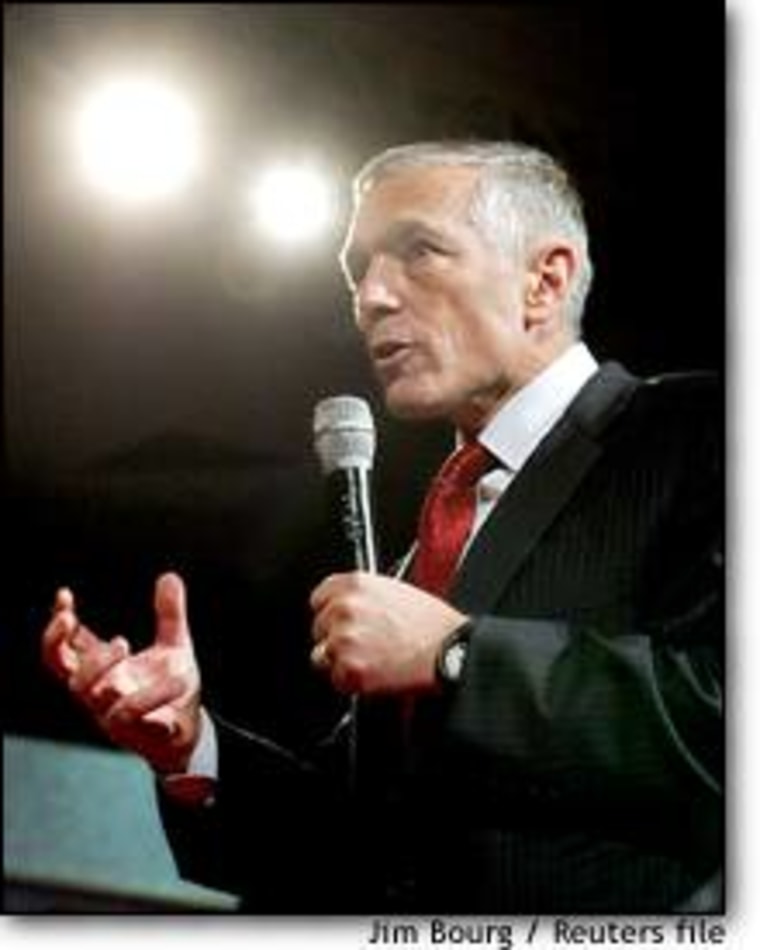As Democratic presidential contender Wesley Clark headed into his second televised debate Thursday night with his eight rivals, his campaign was going through growing pains marked by sharp criticism from some in the volunteer movement who pressed him for months to jump into the race.
Clark, a retired four-star Army general who has never before run for any elective office, leaped into the race Sept. 17 and placed first among the Democratic presidential hopefuls in recent Gallup and Fox News polls of Democrats across the nation.
But in an American Research Group poll released Thursday of likely voters in New Hampshire’s Jan. 27 primary, former Vermont Gov. Howard Dean maintained a double-digit lead over all his rivals.
Compared to Dean’s 29 percent, Clark garnered 5 percent, with a significant portion of those polled, 29 percent, undecided.
JUST LIKE GORE CAMPAIGN?
Stirling Newberry, a Clark supporter and a computer consultant in Lowell, Mass., who maintains the www.DraftClark.com Web site, posted an open letter Wednesday that said Clark’s candidacy was becoming “nothing more than the (Al) Gore campaign (of 2000) with a better candidate.”
MSNBC.com learned of the Newberry letter from an e-mail sent out Wednesday by an operative in the Dean campaign.
One of Clark’s top campaign advisers, Mark Fabiani, served as the deputy campaign manager in Gore’s 2000 campaign. Fabiani is the partner in a political/business consulting firm with Gore’s 2000 campaign spokesman, Chris Lehane, who recently left the campaign of Massachusetts Sen. John Kerry and also advised California Gov. Gray Davis, who lost his recall election Tuesday. Lehane has no role in the Clark campaign, but his wife is working for it.
Fabiani said Thursday that he is a volunteer and that any future role he might have in the campaign is up to Clark. “I’d like to help the general in a way that makes sense for him and makes sense for my clients,” he said.
On Tuesday, Clark’s campaign manager, Donnie Fowler, the son of former Democratic National Committee chairman Don Fowler, quit after telling associates that he was having trouble getting top campaign advisers to take supporters of the draft movement seriously.
“This is the defining moment for the Clark campaign,” Newberry’s letter said, “Either he will show he can take charge, or he will be forever branded a tool of insiders.” In an interview with MSNBC.com Wednesday, Newberry said he was referring to Fabiani.
The Clark campaign brushed off Newberry’s letter.
Speaking from the campaign headquarters in Little Rock, Ark., spokeswoman Maya Israel, a veteran of the Draft Clark movement, said Newberry’s views were “not informed. He has not come down to Little Rock, so he can’t say what’s going on here.”
The veterans of the draft movement who are working at Clark’s Little Rock headquarters, she said, “are all here because we have our eye on the prize.”
DRAFT MOVEMENT VETERANS
Israel said that since Fowler’s exit “I’ve seen even greater pains taken to include members of the Draft Clark movement. She noted that John Hlinko, co-founder of DraftWesleyClark.com, has been appointed to a senior staff position in the campaign as director of Internet Strategy. “They want to make sure we’re driving this train,” Israel said.
Israel estimated that of about 200 grass-root Draft Clark activists around the country, “there four or five who are disgruntled.”
She said a Meetup.com meeting for Clark activists in Miami on Monday Clark will address the importance of volunteer involvement in the campaign.
Newberry explained that he’d posted his open letter because he decided “it was time to come forward and say there is a pervasive pattern of problems. Somebody needed to be the conscience of the movement.”
Newberry emphasized that he is not seeking a job in the Clark campaign.
Referring to Fowler’s departure, Newberry said, “when you lose the son of the former Democratic National Committee chairman and he had stood up for the volunteers in the campaign, that’s a red flag.”
SPEAKING FEES
Newberry also called on Clark “to return any questionable sums of money,” a reference to a story in the Wednesday’s editions of the Washington Post that reported Clark had made paid speeches at DePauw University and other campuses since becoming a candidate on Sept 17.
Clark’s campaign said late Wednesday that he will return payments for the speeches he made since declaring his candidacy and will no longer accept speaking fees.
In a statement, Fabiani said Clark’s advisers had reviewed federal guidelines and determined that his paid speeches were appropriate. But he said, “to avoid any distraction from the real issues that matter to Americans,” Clark decided to return the speaking fees.
LIEBERMAN’S CRITIQUE
Meanwhile, Clark continues to come under fire from his rivals for the nomination, Kerry and Sen. Joe Lieberman of Connecticut.
On Wednesday, Lieberman criticized Clark for issuing contradictory statements three weeks ago on whether he supported last October’s congressional resolution authorizing Bush to go to war against Iraq.
Four of the nine Democratic contenders — Kerry, Lieberman, Sen. John Edwards of North Carolina, and Rep. Dick Gephardt of Missouri — voted for the resolution. Another contender, Rep. Dennis Kucinich of Ohio, voted against it.
“I think that when you are asking the American people to support you for president, you have to be able to take a clear position for what you think is right for the country and stick with it, have the guts to stick with it,” the Connecticut senator said.
Last weekend, in a speech to a meeting of the Democratic National Committee in Washington, Kerry, without naming Clark, bashed the retired general for having voted for Richard Nixon in 1972 and Ronald Reagan in 1984 and for giving a speech at an Arkansas Republican event in May of 2001 praising President Bush, Defense Secretary Donald Rumsfeld and other Bush administration officials.
The Associated Press contributed to this report.
